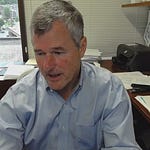Mats Ingulstad — historian at NTNU and lead of the TripleDeep project. His research explores the political economy of minerals and the role of the ocean in the industrial and geopolitical imagination of the 20th century.
Get in touch with Mats here: https://www.ntnu.edu/employees/mats.ingulstad
🧭 Episode Overview
In this second part of our conversation, we trace the forgotten history of deep sea mining—from the 19th-century Challenger expedition to Cold War anxieties and 21st-century geopolitics. Mats unpacks how policymakers came to see the ocean as both a limitless source of minerals and a pressure valve for post-war scarcity fears. We explore how ideas of abundance, global equity, and national security shaped early efforts to regulate the seafloor—and why those debates still echo today.
📌 Episode Highlights
00:00 — The Challenger expedition and the first discovery of manganese nodules
02:35 — Fritz Haber and the dream of gold from seawater
03:50 — WWII, Korean War, and fears of mineral depletion
05:05 — The 1960s growth model and minerals as a peace dividend
06:40 — “Common heritage of mankind”: abundance, not scarcity
08:15 — Scientific misconceptions about deep sea ecosystems
09:55 — Deep sea mining as a central issue in UNCLOS negotiations
11:00 — 1980s market optimism and the “dematerialization” thesis
12:15 — China, rare earths, and the return of mineral geopolitics
13:30 — The EU’s “blue growth” vision for ocean mining
14:45 — The uneven playing field: cheap nodules vs. land-based producers
17:00 — Calls for production caps to protect terrestrial economies
19:45 — Deep sea mining as “the poor man’s space mining”
21:10 — The Jevons Paradox: will DSM reduce or increase extraction?
22:35 — The shift from climate framing to national security framing
25:10 — Making decisions across incomparable value categories
26:10 — Why we need historians, philosophers, and social scientists in this space
28:40 — Where we’re at today: too early to decide, but better informed
29:50 — Reading suggestions and the conceptual challenge of writing a history of a non-existent industry
Theme music: Tamarack by Jesse Matas
📚 Resources Mentioned
Helen Rozwadowski – books on the history and imagination of the ocean
Tirza Meyer – https://tirzameyer.com/books/
Oles Sparrenberg – German-language book on deep sea mining in Germany
paper in english: A historical perspective on deep-sea mining for manganese nodules, 1965–2019 https://www.sciencedirect.com/science/article/pii/S2214790X18303137
TripleDeep project (NTNU) – interdisciplinary research on DSM












Share this post